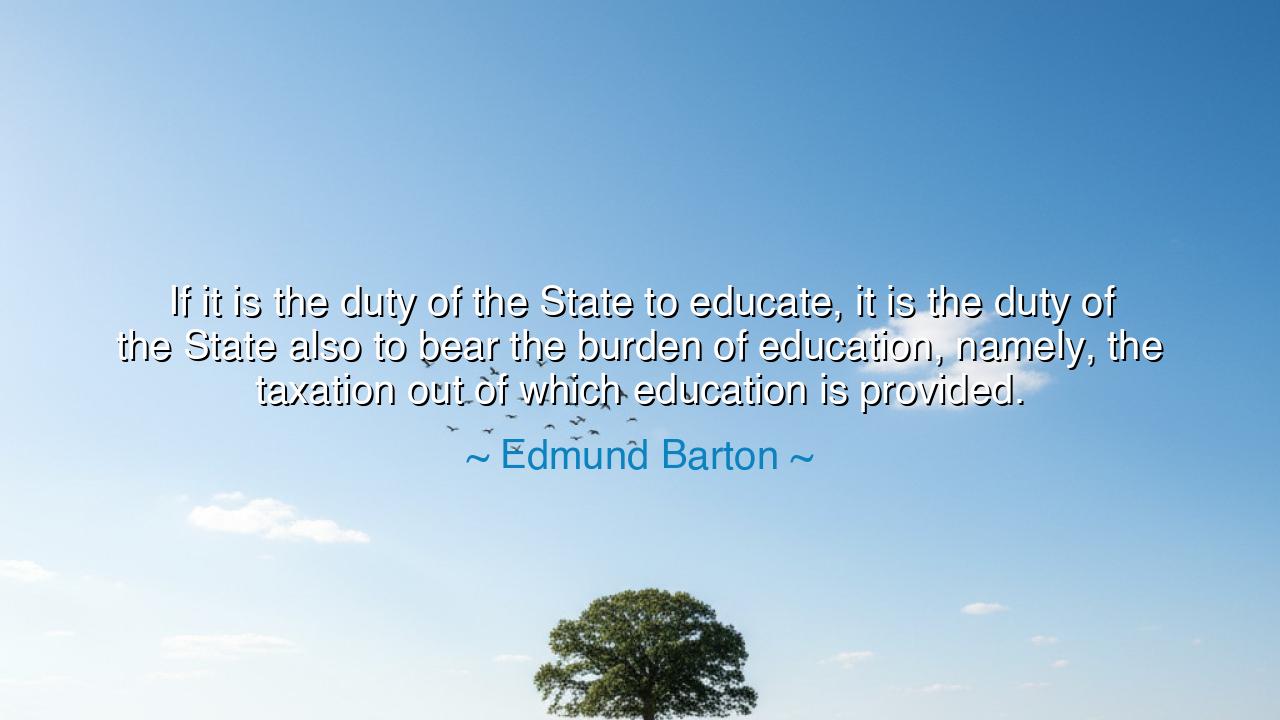
If it is the duty of the State to educate, it is the duty of the
If it is the duty of the State to educate, it is the duty of the State also to bear the burden of education, namely, the taxation out of which education is provided.






The statesman Edmund Barton, the first Prime Minister of Australia and one of the architects of its federation, once declared with great clarity: “If it is the duty of the State to educate, it is the duty of the State also to bear the burden of education, namely, the taxation out of which education is provided.” In this noble saying, Barton speaks not merely as a politician, but as a philosopher of civic duty. He reminds us that the true strength of a nation lies not in its wealth nor its armies, but in the minds of its people—and that to nourish those minds is both a moral and a financial responsibility of the State. Education, he teaches, is not a privilege for the fortunate few, but a sacred trust that must be sustained by the collective will of the many.
To understand his words, we must return to the world in which he lived. The late nineteenth century was a time of great transformation in Australia and across the British world—a time when nations began to awaken to the idea that public education could shape destiny. The old order had held learning as a private luxury, the domain of churches and the wealthy. But men like Edmund Barton saw that democracy could not endure if knowledge remained the possession of a few. The uneducated citizen is easily swayed, easily divided, and easily oppressed. Therefore, if the State claimed the right to govern its people, it must also assume the duty to enlighten them. To educate without providing the means, he warned, is hypocrisy—to promise bread but deliver only stones.
Barton’s wisdom rests upon a profound moral truth: that education is both a blessing and a burden, and both must be shared. For education demands not only effort from the learner, but investment from the society that nurtures them. When he spoke of taxation, Barton did not mean it as punishment or burden, but as the rightful price of civilization. To pay for the schooling of children is to plant the seeds of national prosperity; to refuse is to starve the future. Just as a farmer must tend his field if he hopes for harvest, so must a nation nourish its schools if it hopes for peace and progress.
History has proven his insight again and again. Consider the rise of Japan after the Meiji Restoration of 1868. When the leaders of that nation cast off the isolation of centuries, they declared that the strength of the new Japan would be found not in conquest, but in education. They taxed themselves heavily to build schools, to train teachers, and to send students abroad to learn the arts and sciences of the world. Within a generation, Japan had transformed from a feudal land into a modern power. The burden they bore through taxation became the foundation of their greatness. Thus, Barton's wisdom was not confined to his own nation—it was universal, echoing through every society that dares to rise by the light of knowledge.
And yet, in every age, there are those who resist this truth. They call education an expense, not an investment; they forget that ignorance costs more dearly than any tax. The uneducated child, left without guidance, becomes a burden far heavier than any coin spent on their schooling. Barton foresaw this danger. His words were both a defense and a warning: that if the State shirks its duty to educate, it weakens itself. For a nation without learning is like a fortress without walls—vulnerable to corruption, division, and decay.
Thus, his quote is not only political, but spiritual. It is a reminder that responsibility is the soul of freedom. The citizen who enjoys liberty must pay for the schools that preserve it. The parent who dreams of a better world must be willing to contribute to the education that builds it. Barton calls us to see taxation not as loss, but as sacrifice for the common good, a shared offering upon the altar of progress. Each coin given to the schooling of others returns a hundredfold in peace, justice, and prosperity.
The lesson, then, is timeless: Education is the foundation of every just nation, and its cost must be borne by all. If we cherish freedom, we must also cherish the institutions that protect it. Let each generation remember Barton’s truth—that it is not enough to demand learning; we must also sustain it. Support your schools, honor your teachers, and see your taxes not as chains, but as seeds. For the wealth of a nation is not stored in gold, but in the hearts of its children and the strength of their minds.
So let these words of Edmund Barton be engraved upon the conscience of every people: “If it is the duty of the State to educate, it is the duty of the State also to bear the burden of education.” The burden is heavy, yes—but it is the burden of greatness. The wise nation does not flee from it; it carries it proudly, knowing that from the weight of that burden comes the rising of a brighter dawn.






AAdministratorAdministrator
Welcome, honored guests. Please leave a comment, we will respond soon